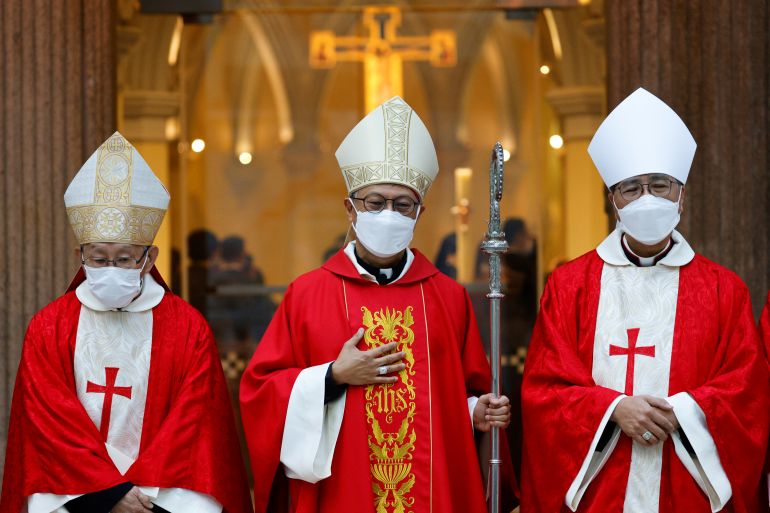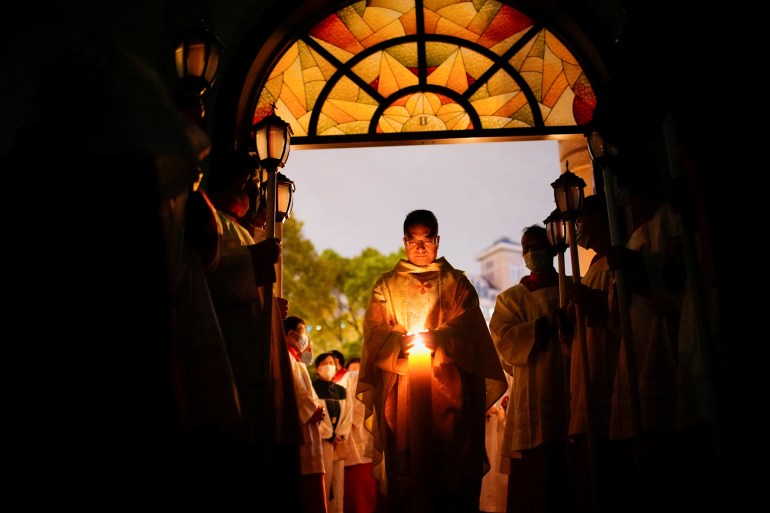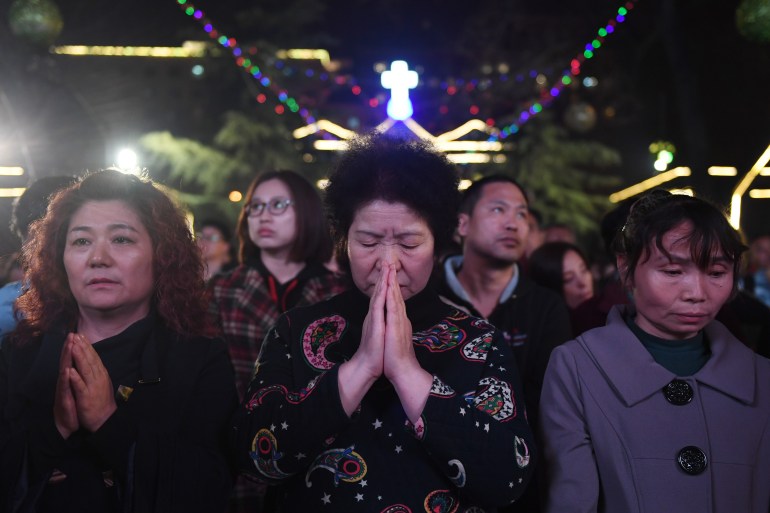Hong Kong Bishop heads to mainland China amid Vatican strains
Stephen Chow’s visit comes as China’s Beijing-approved Catholic Church makes appointments in defiance of Vatican deal.

Hong Kong, China – Hong Kong Bishop Stephen Chow will embark on his first official visit to China on Monday, but is “unlikely” to meet representatives from the mainland’s “underground” churches, a spokesperson said, amid continuing strains between Beijing and the Vatican over the governance of the country’s Catholics.
Chow will be the first Hong Kong bishop – the head of the Catholic Church in Hong Kong and overseen by the Vatican – to make an official visit to the mainland since 1994.
Keep reading
list of 4 itemsTaiwanese pray ‘just to be safe’ as Year of the Rabbit nears
UN members condemn China over abuse of Uighurs in Xinjiang
Xi’s economy sees ‘beautiful life’ in China nationalism, control
He will be accompanied by two senior church officials following an invitation from his Beijing counterpart Joseph Li Shan, according to a church statement.
In response to Al Jazeera’s inquiries, a spokesperson at the Hong Kong Catholic diocese’s communications office said Li, who took up the post two years ago, was invited to the mainland in 2022.
But the trip only became possible once Beijing lifted its COVID-19 travel restrictions late last year.
The Hong Kong delegation’s mission is to “promote exchanges and interactions” between churches in mainland China and the worldwide Catholic community, the spokesperson added.
The Vatican has long been at odds with Beijing over the Catholic Church in China, where the Communist Party is wary of any mass organisations over which it has no direct control.

Catholic churches in mainland China must register with and operate under the state-affiliated Catholic Patriotic Association, an organisation overseen by the party’s United Work Front Department and led by Li, that the Vatican does not recognise.
Professor Tobias Brandner, associate director of the Divinity School of Chung Chi College at the Chinese University of Hong Kong, described Chow’s trip as “overdue”.
“Twenty-nine years … is a long period of no (official) visits, which in itself may be unusual,” Brandner said, adding that there had been official visits by the Protestant church in Hong Kong during that time.
Religions must ‘adapt’
In March, China’s new Premier Li Qiang told the National People’s Congress it was necessary for the party to “actively guide religions to adapt to socialist society” and said the process had been taking place gradually.
Churches on the mainland that resist state regulations usually meet in secret with those running what are known as “underground churches” running the risk of fines and jail time.
While Chow may touch on various issues during the trip, the spokesperson said: “It is unlikely that he will visit the so-called ‘underground churches’ in Beijing.”
According to the Chinese government, there are more than 5.5 million Catholics in the country. Organisations outside of mainland China, such as the Pew Research Center and Hong Kong’s Holy Spirit Study Centre, put the Catholic population closer to 10 million, taking into account those who do not attend the “official” churches.
While there are no formal diplomatic relations between Beijing and the Vatican, the two sides came to a provisional agreement over the appointment of bishops in China in 2018.
The contents of the agreement have never been made public, but it reportedly allowed the Vatican to officially appoint bishops in China, while China has also recognised the pope as the supreme leader of the Catholic Church.
While the long gap since a Hong Kong bishop last visited the mainland might be explained by the pandemic, Brandner said Beijing’s opposition to Cardinal Joseph Zen Ze-Kiun, who led the Catholic church in Hong Kong from 2002 to 2009 and has been outspoken in his criticism of Beijing’s efforts to control religion, may also have been a factor.
Zen rejected the 2018 agreement and is also a prominent supporter of democracy. He was one of six people found guilty last November of failing to register a support fund established to provide legal aid to those arrested during 2019’s mass pro-democracy protests.
“Their mainland Chinese [counterparts] would not have been equally welcoming of Zen,” Brandner said.
While the invitation had come from the Beijing diocese, instead of the Chinese government, Brandner said it would only amount to a “difference in ritual”, given Li’s close ties with the government.

The last visit to take place in an official capacity was in 1994 when Cardinal John Wu Cheng-chung visited three cities in mainland China.
Mok Chit-wai, a commentator on Hong Kong religious affairs, expects Chow’s trip to have more of a symbolic meaning than an actual effect on Sino-Vatican ties.
In the current international climate, Mok said it would be to Beijing’s advantage to maintain working relations with the Vatican, which is a sovereign state in Europe.
“I am more prone to argue that Beijing wants to pass on certain messages to the Holy See through the Hong Kong delegates. But what messages? I can’t tell,” he said.
Mok also said that Sino-Vatican relations remained strained, despite the extension of the 2018 agreement amid unresolved issues concerning the Catholic faith in China, such as the appointment of bishops and creation of dioceses.
In November last year, the pope issued a statement expressing “surprise and regret” at Chinese authorities’ move to make Peng Weizhao the auxiliary bishop of Jiangxi, a diocese that the Vatican does not recognise.
The Vatican statement read that the appointment had “not taken place in conformity with the spirit of dialogue that exists between the Vatican parties and the Chinese parties” and had run against the Sino-Vatican agreement.
This month, Beijing announced a new bishop for Shanghai, the country’s biggest Catholic diocese. The Vatican said that appointment was also made without its approval.